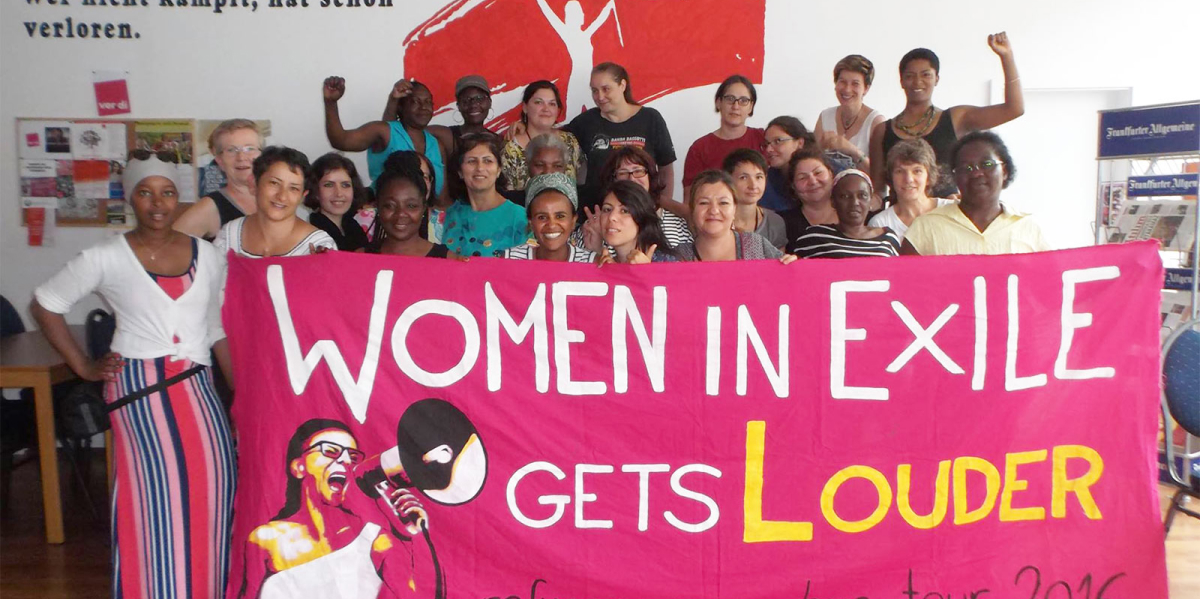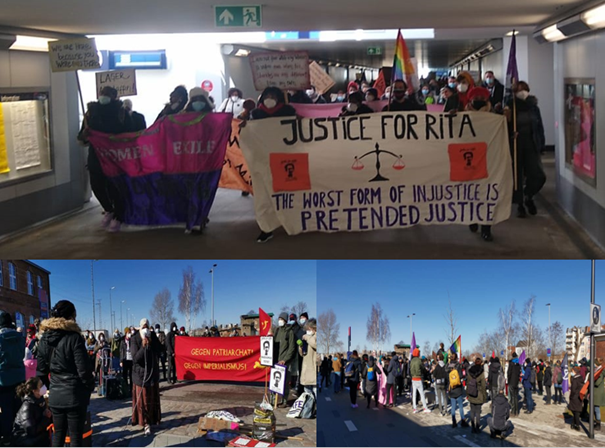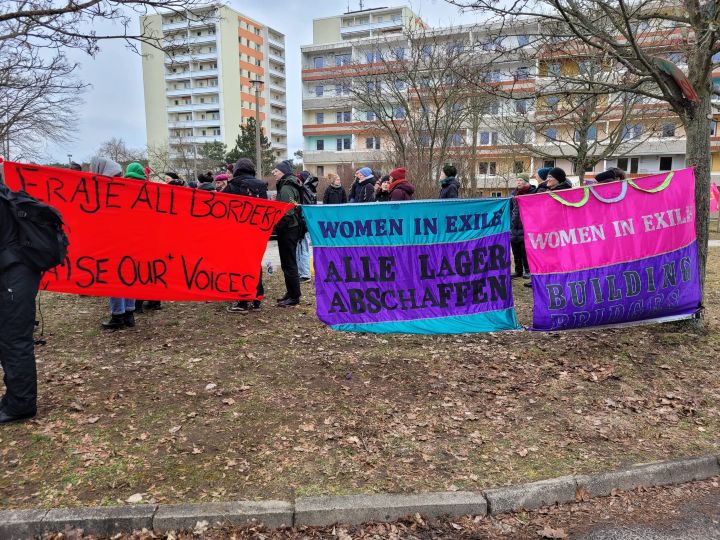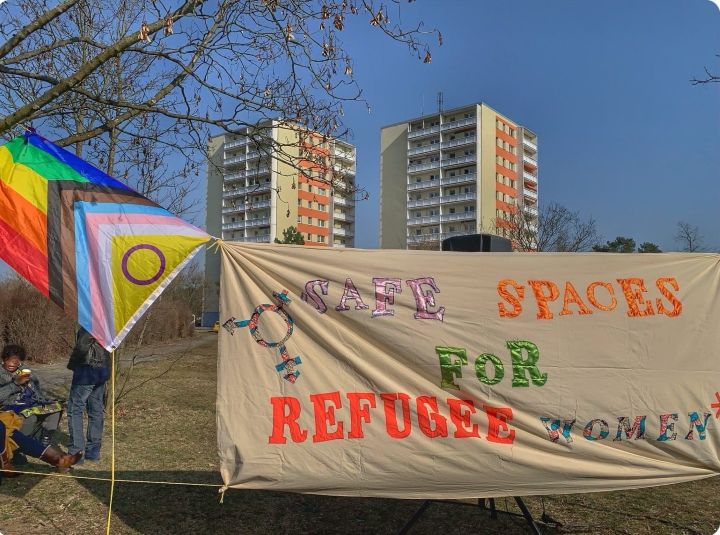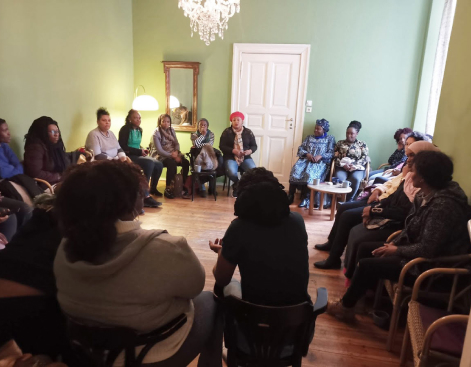Excerpt from pages 137–141 of our book “Breaking Borders to Build Bridges“ available through Edition Assemblage
Conversation between Khongith (17) and Peer (friend of Women* in Exile)
P.: Hello, Khongith. First of all, thank you for agreeing to an interview for Women in Exile. Could you please introduce yourself?
K.: Yes, I’m Khongith, I’m 17 now, and I’m from Bielefeld. As far back as I can remember, my godmothers always accompanied me to meetings with Women in Exile. And I feel that was always part of getting together with my family.
P.: So you got to know Women in Exile through your godmothers?
K.: Yes, my godmothers were involved in Women in Exile long before we met. When I was a baby, they kind of always borrowed me, I guess… so I was usually at their place one day a week, sometimes more. And so, when it was time for a meeting, a plenary or something, I took that in and was there too. I didn’t get that much – it wasn’t as if I was taking part. But I always wandered around happily, met all sorts of people and noticed that there was always a very friendly atmosphere.
P.: Do you remember any special things, maybe from when you were older – any tours or demos or campaigns, festivals you went along to?
K.: Yes, I definitely remember there were heaps of workshops where the women* met. I didn’t really take part in the workshops because I wasn’t that interested between 5 and 8. But I know that my godmother K. always cooked for them. And then at some point I also took an interest and joined in. And even before that, I did childcare with my other godmother, and then I always observed the other people around me working and exchanging ideas. The raft tour is the most exciting thing I can think of right now. It also lasted a few days. And so we toured through Germany on a raft. That was by far the biggest highlight I connect with Women in Exile. It was awesome sauce! I liked it so much.
P.: I think it’s more exciting for children to be out and about on a raft than doing workshops.
K: You bet. (laughs)
P.: You said you also helped with the cooking?
K.: Yes, when I was at an age where, I admit… there was a time I didn’t think other kids were so great… and then it was great fun to cook with K. So we did that a few times. I certainly did. Well, I only had time during the holidays. And then it was like, when there were meetings that went for several days, that we rotated. That’s how I remember it being. We’d cook one day and someone else would cook the next. And with really big camps there were several of us cooking. Sometimes in super special kitchens you don’t usually have access to. I mean, you don’t normally need a pan to cook… I don’t know… 20 kilos of rice or something. You only experience things like that at special events. That was pretty amazing.
P.: I remember that you cooked for Women in Exile’s big summer festival on Oranienplatz, where – no joke – you catered for a few hundred people. You and the others made breakfast, lunch and dinner there, right?
K: Yes. We started shopping 2 days beforehand. We wrote lists and chose recipes because the food should be super brill, of course, but not so mega in terms of the effort. When you’re cooking for so many people you also have to keep time management in mind. And the costs, of course. And then later there was the thing where we had a kitchen… I think that was… I don’t remember now… it wasn’t a restaurant, but definitely a big kitchen equipped for occasions like this. And people kept coming and wanted to help. And so we ended up sitting at a huge table, and my cousin was there too, and a few other kids and a few other women* as well. And we were all chopping together. We had huge cooking pots, and we stood on chairs and stirred. When the food was ready, we served it in a big tent. It went down really well, and of course we were pleased about that. And there was almost… no, there was always just enough. I was happy about that, too, because I hadn’t thought there would be enough go round.
P.: I remember the food was always delicious! That’s really stuck in my mind.
What do you think, is Women in Exile interesting for kids and adolescents? Or could the group do something differently to make it more attractive for kids? What practical advice could you give, from your experience?
K.: I’ve never found it boring with Women in Exile. I’ve only ever joined in during the holidays. It was great fun to see everything that was going on. And then there were often kids’ activities. Later we looked after the kids there ourselves. And that kept you pretty busy. When I was older, I found it fascinating to see how committed the women* were, to see the community or to listen in at workshops. It was always in lots of different languages. The mood was always good, at least from what I’ve heard. And it was so interesting just seeing what the people were like, and then seeing that everyone was involved and motivated. I found that very exciting. And if you weren’t interested in that, it was no trouble finding others to play with. There were enough people you could do something with. I’ve never had anyone be rude or not respond to me – like we know it from the street, where you often get the feeling that people have such a negative attitude and don’t take an interest in one another. I’ve never had that here. People you’ve never met before are open and engaging and have fun with you. Yes, even as a child I had the impression that Women in Exile was always a kind of meeting place for lots of unknown friends, in a way.
P.: Do you know what Women in Exile is fighting and taking to the streets and doing actions for?
K.: Hmm, I’ve never really thought about it that way before. I mean, sure I’ve thought about it… but I’ve never asked. From what I’ve heard, it’s mainly to do with women*, who are no longer willing or able to live in their home country, being granted rights. And being integrated here, and accepted, and being given opportunities to build a new life for themselves here if they wanto. With a humane standard of living. So on the raft tour, for example, we visited Lagers – I think that’s what they were called – where lots of people were housed together in cramped conditions. And it’s to do with situations like that, for example, being avoided. And abolished, so that people don’t have to live in conditions like that after the ordeal of fleeing from their country of origin and when they’re actually motivated to build a new life for themselves and their kids.
P.: You said you live in Bielefeld. Are there other topics that interest and motivate you or other kids and adolescents right now? What’s it like with the people around you, with your class or your friends?
K.: Fridays for Future is what’s making the biggest waves here at the moment. That’s what you hear most about from the newspaper and television. But I also get the feeling at my school that more and more things are happening. Or maybe I just didn’t notice before? So there’s more and more talk about normal politics in Bielefeld. Big issues like climate change, racism, gender issues… all these things are suddenly being addressed more, where before I had the feeling people weren’t really interested. Or they didn’t show any interest in the sense that they couldn’t even imagine what it meant. Generally I get the feeling that Bielefeld is a super quiet kind of city. Mostly nothing happens.
P.: I’m sure it’s often different to big Berlin. But what you say – the issues that are topical in your environment or what motivates people there – those are topics that are on the agenda in Berlin too, for example climate justice and racism.
K: Definitely. I also believe that these big issues, which spring up Germany-wide, are being dealt with slowly and cautiously here in Bielefeld. But when see the way people in Berlin are really committed and stuff… I think things are still kind of on the back burner here. But it’s definitely changing… slowly.
P.: Is there anything you’d like to do with Women in Exile again? Or that you’d like to send on the way when it turns 20 next year?
K.: What I’d like to do again? I don’t know, I’ve never felt anything’s missing. The actions and stuff are always cool. I also always find the sense of community, the vibes, so special with Women in Exile. And I hope it stays that way too, that this feeling of unity will go on. And definitely that the fight for what we want will go on. I think that’s something you always feel when you’re at a Women in Exile meeting. Apart from that, I always find the actions really cool. That’s why I don’t think I have any particular wishes, but I hope it will stay creative like it is.
P.: Cool, that’s a great wish for Women in Exile for the next 20 years. Then a new generation will come, at some stage.
K.: Definitely, hopefully.
P.: Is there anything else you’d like to add at the end?
K.: I think a lot is already being done. I just hope for Women in Exile’s sake that it becomes more popular. I get the feeling that it’s very well known in Berlin already – maybe it’s also because I always move in the same circles. But I hope it will spread, too, so that if you go to other cities, and if you say Women in Exile, people there too will know what you mean. That’s what I hope and wish for.
P.: Maybe Women in Exile needs to go west again, to Bielefeld, and do some mobilizing?
S: Yes, maybe.
P.: Hey, then thank you for the great interview, Khongith.
K: Thank you.
